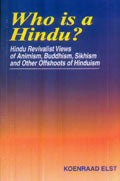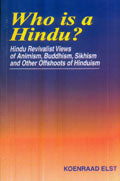Who is a Hindu?: Hindu revivalist views of Animism, Buddhism, Sikhism and other offshoots of Hinduism
Who is a Hindu?: Hindu revivalist views of Animism, Buddhism, Sikhism and other offshoots of Hinduism is backordered and will ship as soon as it is back in stock.
Couldn't load pickup availability
Genuine Products Guarantee
Genuine Products Guarantee
We guarantee 100% genuine products, and if proven otherwise, we will compensate you with 10 times the product's cost.
Delivery and Shipping
Delivery and Shipping
Products are generally ready for dispatch within 1 day and typically reach you in 3 to 5 days.
Book Details
-
Publisher: ADITYA PRAKASHAN Indological Publishers & Booksellers
-
ISBN 13: 9788185990743
-
ISBN 10: 8185990743
-
Edition: New Delhi, 2002
-
Year: 2002
-
Language: English
-
Subject(s): Religion, Voice of India
About the Book
This book addresses the historical and contemporary efforts to manipulate the discourse on religion in India, particularly with regard to Hinduism. The author delves into the actions of British colonizers and their post-independence successors, who have tried to fragment Hindu society by redefining the term "Hindu" and pitting various sects and castes against each other.
In response to these efforts, Hindu Revivalists have worked to reassert the inclusive nature of Hinduism, arguing that various sects such as Jainism, Buddhism, Sikhism, and even tribal animism are integral parts of the Hindu tradition. The author critically examines the common argument put forth by non-Hindu communities that they are egalitarian in contrast to Hinduism, and discusses how such claims often stem from a desire to distance themselves from a religion that has been marginalized and misunderstood.
The book suggests that Hindus, regardless of their sect or community, may find common ground by engaging in shared practices and recognizing the unity in diversity that defines Hinduism. It proposes that even those communities that attempt to separate from Hinduism may, in practice, continue to share in its spiritual heritage.





